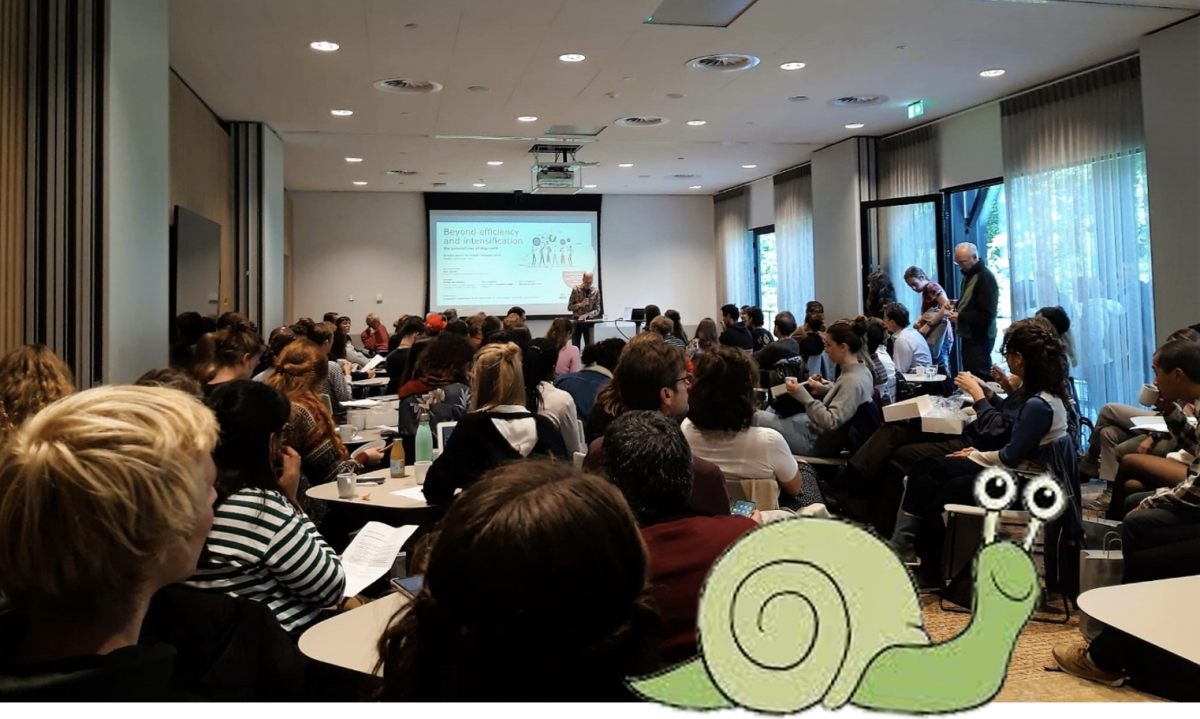Bram Buscher, Chair of the Sociology of Development and Change Group kicked off the lunchtime session to speak to us from the head and from the heart about why de-growth matters.
Engaging as always, he repeated what many of us don’t want to admit; that we are on our way to environmental and sociological collapse. While ‘collapsology’ is such a new term that even my Word spell-check doesn’t recognise it, it is a new discipline devoted to looking at the collapse of societies (speaking of, the book “How everything can collapse” was recommended in case you’re looking to add to your reading list).
Collapse sure sounds doomsday-ish, but as Bram said, this collapse does not happen in a big BOOM like we see in the movies. Collapse is uneven and it is happening all around us already. And that is where we can step in:
How can we now limit the damage that has already been done? And perhaps more importantly, how to give agency and a stake to those who’ll be affected most?
Bram addressed some of the amazing solutions that are often paraded before us – decoupling growth and emissions, trickle-down economics, tourism for sustainability, renewable energy, etc. A key problem, he argued, is that these mainstream solutions fall within a system of capitalist-induced growth that puts more and more pressure on people and the environment.
While capitalism has brought “enjoyment” (to all?), continuous focus on intensification, on trying to do more with less, has led us to operating in a burnout system:
Individuals are burning out, and so too is the planet.
Efficiency, Technology, and Innovation are promoted as the panacea to all our problems, which many of us are conditioned to subscribe to as students of WUR. Yet, whilst not bad per se, if these technologies and innovations do not address the root cause of the problem, i.e. growth, they only distract us from finding real solutions.
De-growth according to him, is a way to address the current socio-political and metabolic system, focusing on social justice. It starts from the premise that the ideology of growth conceals the rising inequalities and ecological destructions associated with capitalism. It advocates for a shrinking of economies rather than continued growth until burnout (another reading suggestion by Bram: “The Future is Degrowth: A Guide to a World Beyond Capitalism”). It emphasises a reduction of global consumption and production and promotes a socially and ecologically sustainable society with well-being as the indicator of prosperity rather than GDP.
As Bram notes, all of this would require a redesign of institutions, structures, ways of thinking and doing such that they are no longer dependent on growth.
This all sounded well and fine but was frustratingly vague and utopic for some in the room (importance of individual socio-political agency was mentioned, but sadly not enough time to get into it). Eveline van Leeuwen from the AMS Institute made things slightly more tangible by talking about ways in which the city of Amsterdam is putting wellbeing (who gets to define it though?) at the centre of their policies instead of growth.
Roel Jongeneel, Senior Scientist at Wageningen Economic Research, also took to the floor. He opened the discussion by saying that:
Growth is one of the most natural phenomena that we have.
Which I thought was a pretty enticing point… At first.
Yes, babies grow to become adults and seeds grow into plants and trees. But the important difference between that kind of natural growth and growth as promoted by capitalism is that babies and plants grow up to a limit, not perpetually. No species grows infinitely, and when populations have grown too much and consumed too many resources in the past, they’ve collapsed.
Opening statement not so convincing after all.
Standing in front of Kate Raworth’s famous Doughnut Economics diagram, Roel promoted an economy that would continue to grow, but while respecting planetary and social boundaries – with emphasis on circularity through innovation, made possible by creativity that capitalism “encourages” (ahem).
The doughnut has attracted criticism from conservatives who say the model cannot compete with capitalism’s proven ability to lift millions out of poverty, while critics on the left argue that it fails to address the ideology and political structures which are at the root of the world’s biggest issues (Roel himself seemed sceptical about the viability of a doughnut economy without proper international institutions to govern it).
Gerrit Stegehuis, concerned citizen from the Dutch platform on a sustainable and solidary economy, seemed to be of the latter opinion.
Efficiency, he said, will not solve our problems; instead, we should be talking about sufficiency.
Basic human needs such as healthcare, education and mobility must have priority over conspicuous consumption. We must go for private sufficiency, to have public luxury.
The closing statement by a member of the audience was perhaps the most tangible commentary made during the slightly chaotic hour.
A de-growth economy, he said, seems far too ambitious in a world that cannot even agree on carbon emissions targets.
Plus, if the discussion had been happening in Costa Rica where he was from, we would have been kicked out which leads to important questions like: should everyone de-grow? A nice counterpoint perhaps at the end of a session by four European speakers, positioning their arguments with a mostly Western-centric outlook.
Indeed, as Bram Buscher admitted, the change of seeing economies based on de-growth is small.
What might be more feasible, the audience member argued, is to properly define what constitutes growth.
Growth that results in the loss of homes should not be considered growth. Growth that results in people dying should not be considered growth. Growth that results in environmental destruction should not be considered growth.
How is it that we live in a world which still considers these growth?
This was the first of Dialogue Series organised by the Social Sciences Group (SSG) on ‘Bringing society into science’. More to follow! For comments or questions about the Dialogue Series, contact: eugenia.leon@wur.nl.

